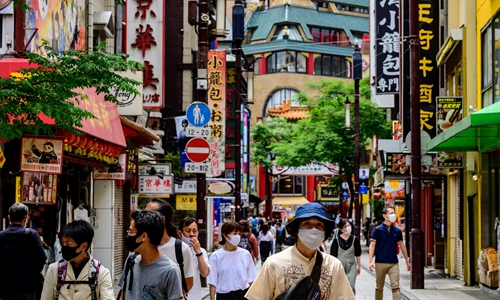Cooperating with China the best way for Japan to achieve economic recovery: Japanese economist
By Xing Xiaojing Source:Global Times Published: 2020/6/10 22:43:40

People wearing face masks visit the Chinatown area in Yokohama on Tuesday. Japan lifted a nationwide state of emergency over the coronavirus on Monday. Photo: AFP
The economic relations between China and Japan will grow "closer and closer" in the post-pandemic era and cooperating with China is the best way for Japan to see a fast economic recovery, Kiyoyuki Seguchi, research director of the Japan-based Canon Institute for Global Studies, told the Global Times.
"Those who advocate a decoupling with China do not understand the economy, and those companies who are leaving China are not competitive," Seguchi said. "The best Japanese firms benefit from closer China-Japan economic ties and they are willing to expand investment in China rather than leaving," he noted.
Rhetoric about decoupling from China has been on the rise in Japan in recent months, after some blamed Japan's economic woes on its excessive reliance on the Chinese economy. The Japanese tourism industry has taken a dive due to the impact from reduced Chinese visitors and some local supplies have been cut off due to Chinese factories' suspended operation.
Seguchi dismissed such concerns and stressed that the economic ties between China and Japan will get closer after the pandemic outbreak ebbs. While China's economy has been on a track of steady recovery since April, Japan has also reopened recently as the pandemic has been brought under control in the country.
The economist noted that Japanese firms used to diversify investments to avoid risks. Some also were reluctant to produce key parts in China over worries that the technology could be leaked.
"Some Japanese firms' factories in China did run into trouble at the height of the pandemic. But since early March, Chinese companies have been providing support for foreign enterprises amid efforts to restart the economy. In other countries such as the US, Japanese firms do not receive the same level of help, which makes them realize that setting up production lines in China may be the safest option," Seguchi explained.
Echoing his words, a number of Japanese firms have scaled up investment in China in recent days, which analysts said signaled "a vote of confidence" in the business environment in China.
In March, Japanese electric motor manufacturer Nidec Corporation started construction of its new plant in Dalian, Northeast China's Liaoning Province. The facility is expected to be completed next year, with an annual output of 3.6 million electric motors. The company also raised the scale of investment from 50 billion yen ($466 million) to 100 billion yen to underscore its confidence in the Chinese economy.
Japan-based automaker Toyota also announced plans in March to invest 130 million yen to build a new-energy vehicle factory in North China's Tianjin Municipality.
As China has been taking the global lead in applying technologies such as artificial intelligence, telemedicine, remote education and mobile payment in combating the coronavirus, Japanese firms also seek to learn from their Chinese peers in those industries, according to Seguchi. "A number of Japanese investors are considering setting up research and development centers in China. The Chinese market is getting more important."
He added that China's economy is now three times the size of Japan's, which means "more and more opportunities" for Japanese firms.
In 2010, China's GDP passed that of Japan to become the world's second-largest economy after the US. In 2019, China's GDP grew 6.1 percent year-on-year to 99 trillion yuan.
Despite the impact of the coronavirus outbreak, Seguchi is confident that China can smoothly navigate through the year to maintain a steady economy. "It is quite normal that China did not set a GDP target for 2020 as the onslaught of the coronavirus poses great uncertainty for the world economy. China's economy is deeply embedded in the global supply chain."
The US has been lambasting China over missteps in handling the coronavirus outbreak. Seguchi criticized such moves as "politicizing" certain issues, which is bucking the global trend and not conducive to global cooperation.
"China and Japan will take greater responsibility in the globalization process" in the post-virus period, Seguchi noted.